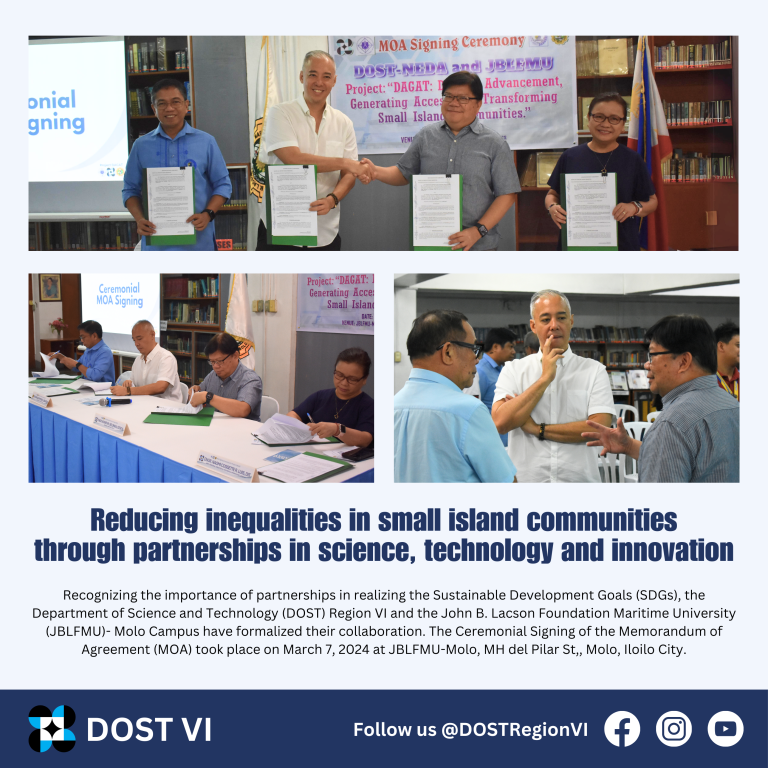Reducing Inequalities in Small Island Communities through Partnerships in Science, Technology, Innovation (STI)
Recognizing the importance of partnerships in realizing the Sustainable Development Goals (SDGs), the Department of Science and Technology (DOST) Region VI and the John B. Lacson Foundation Maritime University (JBLFMU)- Molo Campus have formalized their collaboration. The Ceremonial Signing of the Memorandum of Agreement (MOA) took place on March 7, 2024 at JBLFMU-Molo, MH del Pilar St., Molo, Iloilo City.
The partnership aims to implement the first component of the project, “Driving Advancement, Generating Access, and Transforming Small Island Communities (DAGAT)” which is on the development of a water desalination system that will provide clean water to one small island community in Nueva Valencia, Guimaras. Project DAGAT aims to address inequalities experienced by small island communities (SDG 10) by providing them access to potable water (SDG 6), clean energy (SDG 7), and disaster preparedness (SDG 13). Given the inherent difficulties in securing drinkable water on small islands juxtaposed with their abundance of seawater, the concept of desalination emerges as a viable solution to extract salt particles from seawater and produce potable water. This project will not only showcase the capacity of institutions within Region VI to provide technological advancements in water desalination, wind turbines, and weather stations but also serves to demonstrate to the public the local expertise and capacity to develop technological solutions. JBLFMU-Molo is a member of the Western Visayas Consortium for Industry, Energy, and Emerging Technology Research and Development (WVCIEERD). Currently, they have an ongoing project with the DOST-Philippine Council for Industry, Energy, and Emerging Technology Research and Development (PCIEERD) on the development of a marine sewage treatment plant (MSTP). Dr. Ronald Raymond L. Sebastian, the CEO of JBLFMU, expressed his anticipation for the forthcoming projects, reiterating their commitment to become the pioneer university in maritime research and development.

In his closing remarks, Engr. Rowen R. Gelonga, DOST VI Regional Director, emphasized the significance of acknowledging the challenges faced by communities and their lack of access to essential resources. Leveraging the technical expertise and resources of DOST and JBFLMU, he highlighted the collective responsibility to offer technological solutions to address these pressing social issues.
Project DAGAT is a project funded by the National Economic Development Authority (NEDA) through its Innovation Grant Fund. Beyond addressing SDGs 6, 7, 10, and 13, the project also contributes to SDG 17, which focuses on fostering partnerships for sustainable development. (KSBBernardino, MPFZamora/RDIMS)

